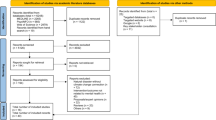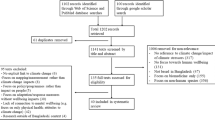Abstract
Climate change is the largest threat to human health of the twenty-first century. Women are disproportionately affected by climate change. While the physical health impacts of climate change are an active area of research, works related to the mental health impacts are less developed. Furthermore, the mental health impacts of climate change on women are a particular area of interest due to women’s disproportionately negative experiences with climate change and climate change–related events. Therefore, the purpose of this scoping review is to understand what is known from the existing literature regarding the mental health impacts of climate change on women. The methods for this review follow the Arksey and O’Malley framework for a scoping review. By searching databases for publications that discuss women, mental health, and climate change, and screening for relevant work, 20 studies that met inclusion criteria were included in the review. Themes derived from the reviewed studies include negative mental health outcomes, gender-based violence, burdens of care and responsibility, attachment to land and traditions, and the importance of intersectionality. From these findings, there is a clear need for climate policies on adaptation and mitigation to reflect women’s unique needs to ensure their health and safety.

Similar content being viewed by others
References
Costello A, Abbas M, Allen A, Ball S, Bell S, Bellamy R, et al. Managing the health effects of climate change: Lancet and University College London Institute for Global Health Commission. The Lancet. 2009 May 16;373(9676):1693–733.
Howard C, Rose C, Rivers N. Lancet Countdown 2018 report: briefing for Canadian policymakers [Internet]. 2018 [cited 2021 Apr 14]. Available from: https://storage.googleapis.com/lancet-countdown-preprod/2019/10/2018-lancet-countdown-policy-brief-canada.pdf
Haines A, Clark H, Phumaphi J, Whitmee S, Green R. The Lancet Pathfinder Commission: pathways to a healthy, zero-carbon future—a call for evidence. The Lancet. 2021;397(10276):779.
Sellers S, Ebi KL, Hess J. Climate change, human health, and social stability: addressing interlinkages. Environ Health Perspect. 2019;127(4):045002.
Chiabai A, Quiroga S, Martinez-Juarez P, Higgins S, Taylor T. The nexus between climate change, ecosystem services and human health: towards a conceptual framework. Sci Total Environ. 2018;635:1191–204.
Watts N, Amann M, Arnell N, Ayeb-Karlsson S, Beagley J, Belesova K, et al. The 2020 report of The Lancet Countdown on health and climate change: responding to converging crises. The Lancet. 2021;397(10269):129–70.
Cunsolo Willox A, Stephenson E, Allen J, Bourque F, Drossos A, Elgarøy S, et al. Examining relationships between climate change and mental health in the Circumpolar North. Reg Environ Change. 2015;15(1):169–82.
Ajibade I, McBean G, Bezner-Kerr R. Urban flooding in Lagos, Nigeria: patterns of vulnerability and resilience among women. 2013;13.
Perrotta K. Climate-change-toolkit-for-health-professionals-updated-April-2019–2.pdf [Internet]. 2019 [cited 2021 Apr 14]. Available from: https://cape.ca/wp-content/uploads/2019/05/Climate-Change-Toolkit-for-Health-Professionals-Updated-April-2019-2.pdf
Hayes K, Poland B. Addressing mental health in a changing climate: incorporating mental health indicators into climate change and health vulnerability and adaptation assessments. Int J Environ Res Public Health. 2018;15(9).
Alston M. Women and adaptation: women and adaptation. Wiley Interdiscip Rev Clim Change. 2013;4(5):351–8.
Kishor Patel S, Agrawal G, Mathew B, Patel S, Mohanty B, Singh A. Climate change and women in South Asia: a review and future policy implications. World J Sci Technol Dev. 2020;17(2):23.
World Health Organization. Gender, climate change and health [Internet]. Geneva, Switzerland; 2014 p. 44. Available from: https://apps.who.int/iris/bitstream/handle/10665/144781/9789241508186_eng.pdf
Eastin J. Climate change and gender equality in developing states. World Dev. 2018;107:289–305.
Balikoowa K, Nabanoga G, Tumusiime DM, Mbogga MS. Gender differentiated vulnerability to climate change in Eastern Uganda. Clim Dev. 2019;11(10):839–49.
IUCN. Gender and climate change [Internet]. IUCN. 2015 [cited 2022 Jan 19]. Available from: https://www.iucn.org/resources/issues-briefs/gender-and-climate-change
Alston M. Gender and climate change in Australia. J Sociol. 2011;47(1):53–70.
Parkinson D. Women’s experience of violence in the aftermath of the Black Saturday bushfires. 2015 [cited 2022 Jan 21]; Available from: http://rgdoi.net/https://doi.org/10.13140/RG.2.1.4265.9047
Ara Parvin G, Reazul Ahsan SM. Impacts of climate change on food security of rural poor women in Bangladesh. Manag Environ Qual Int J. 2013;24(6):802–14.
Eissler S. Chocolate and climate change: investigating gender dynamics of small-scale cacao producers in Lampung and South Sulawesi Indonesia. 2019.
Government of Canada E and CC. Women and climate change [Internet]. 2018 [cited 2022 Jan 19]. Available from: https://www.canada.ca/en/environment-climate-change/services/climate-change/women.html
Sellers S. Gender and climate change: a closer look at existing evidence [Internet]. Global Gender and Climate Alliance; 2016 [cited 2022 Jan 19] p. 27. Available from: http://wedo.org/wp-content/uploads/2016/11/GGCA-RP-FINAL.pdf
Albrecht G, Sartore G-M, Connor L, Higginbotham N, Freeman S, Kelly B, et al. Solastalgia: the distress caused by environmental change. Australas Psychiatry Bull R Aust N Z Coll Psychiatr. 2007;15(Suppl 1):S95-98.
Petrasek MacDonald J, Cunsolo Willox A, Ford JD, Shiwak I, Wood M, IMHACC Team, et al. Protective factors for mental health and well-being in a changing climate: perspectives from Inuit youth in Nunatsiavut, Labrador. Soc Sci Med 1982. 2015;141:133–41.
Willox AC. “From this place and of this place”: climate change, sense of place, and health in Nunatsiavut, Canada. Soc Sci. 2012;10.
Comeau DL, Nunes D. Healthy climate, healthy New Brunswickers. 2019;47.
Meyiwa T, Maseti T, Ngubane S, Letsekha T, Rozani C. Women in selected rural municipalities: resilience and agency against vulnerabilities to climate change. Agenda. 2014;28(3):102–14.
WHO. Gender and women’s mental health [Internet]. World Health Organization. [cited 2021 Apr 14]. Available from: https://www.who.int/teams/maternal-newborn-child-adolescent-health-and-ageing/maternal-health/about/mental-health-and-substances-use
Kaijser A, Kronsell A. Climate change through the lens of intersectionality. Environ Polit. 2014;23(3):417–33.
Crenshaw K. Demarginalizing the intersection of race and sex: a Black feminist critique of antidiscrimination doctrine, feminist theory and antiracist politics. Chic Unbound. 1989;1:31.
Davis AY. Women, Race, & Class. Place of publication not identified: Knopf Doubleday Publishing Group; 1981.
Hamilton-Hinch B-AG. Surviving the impact of the experience of racism on health and well-being: an exploration of women of African ancestry living in Nova Scotia [Internet]. Dalhousie University; 2015. Available from: https://dalspace.library.dal.ca/bitstream/handle/10222/73601/Hamilton-Hinch-Barbara-Ann-PhD-INTE-December-2015.pdf?sequence=1&isAllowed=y
Hill Collins P. Black feminist thought: knowledge, consciousness, and the politics of empowerment [Internet]. Second. Routledge; 2000 [cited 2021 May 5]. 354 p. Available from: https://uniteyouthdublin.files.wordpress.com/2015/01/black-feminist-though-by-patricia-hill-collins.pdf
Lorde A. Sister outsider: essays and speeches. Vol. 1. Crossing Press; 1984. 190 p.
The Combahee River Collective. The Combahee River collective statement [Internet]. 1983 [cited 2021 Jun 13]. Available from: https://d1wqtxts1xzle7.cloudfront.net/63664556/combahee_river_statement20200618-38507-xcxt2r.pdf?1592466401=&response-content-disposition=inline%3B+filename%3DThe_Combahee_River_Collective_Statement.pdf&Expires=1623589827&Signature=UW1HLxHbTSSHhtQqZ0Omj3ImT0s3RChj~DFAAPMpSYVCwpPlbzjpBR1vCsYMSItx1v5MvEMNB5guMfd4LZOzBS9cN5-VMPYAf6po0RoA-MXhvtKwP9mEmldEuzV2U4haHHCVx8AbObORRMZ92pp8AdW1St7QPVqlWaMAm8Ibn6BFtkQlpcUA6FnwKjCC4KknO1PTI9yuBNPU5Orn0T9lTXN9v05ZoEWiu2P7BKV7IUcB9XRGnh1t1yrnGVdE1a-Y5iHL~Cn35hI7qmbfyAma5P8DM5ni2baagyd0wIfI4bpkLcdwfWqeSKiqqpIgxwVxtN~j5vni~OJGFvON6ZZIaQ__&Key-Pair-Id=APKAJLOHF5GGSLRBV4ZA
Wilson K. Therapeutic landscapes and First Nations peoples: an exploration of culture, health and place. Health Place. 2003;9(2):83–93.
Arksey H, O’Malley L. Scoping studies: towards a methodological framework. Int J Soc Res Methodol. 2005;8(1):19–32.
Stott PA, Christidis N, Otto FEL, Sun Y, Vanderlinden J-P, van Oldenborgh GJ, et al. Attribution of extreme weather and climate-related events. WIREs Clim Change. 2016;7(1):23–41.
Braun V, Clarke V. Using thematic analysis in psychology. Qual Res Psychol. 2006;3:77–101.
du Bray M, Wutich A, Larson KL, White DD, Brewis A. Anger and sadness: gendered emotional responses to climate threats in four island nations. Cross-Cult Res. 2019;53(1):58–86.
Mamun MA, Huq N, Papia ZF, Tasfina S, Gozal D. Prevalence of depression among Bangladeshi village women subsequent to a natural disaster: a pilot study. Psychiatry Res. 2019;276:124–8.
Hayes K. Responding to a changing climate: an investigation of the psychological consequences of climate change and community-based mental health responses in High River. ProQuest LLC; 2019.
Beaumier M, Ford JD. Food insecurity among Inuit women exacerbated by socio-economic stresses and climate change. Canadian Journal of Public Health; 2010.
Boetto H, McKinnon J. Rural women and climate change: a gender-inclusive perspective. Aust Soc Work. 2013;66(2):234–47.
Anastario M, Shehab N, Lawry L. Increased gender-based violence among women internally displaced in Mississippi 2 years post–hurricane Katrina. Disaster Med Public Health Prep. 2009;3(1):18–26.
Dean JG, Stain HJ. Mental health impact for adolescents living with prolonged drought. Aust J Rural Health. 2010;18(1):32–7.
Demetriades J, Esplen E. The gender dimensions of poverty and climate change adaptation. IDS Bull. 2009;39(4):24–31.
Durkalec A. Understanding the role of environment for Indigenous health: a case study of sea ice as a place of health and risk in the Inuit community of Nain, Nunatsiavut. 2013.
Sundblad E-L, Biel A, Gärling T. Cognitive and affective risk judgements related to climate change. J Environ Psychol. 2007;27(2):97–106.
Durkalec A, Furgal C, Skinner MW, Sheldon T. Climate change influences on environment as a determinant of Indigenous health: relationships to place, sea ice, and health in an Inuit community. Soc Sci Med. 2015;136–137:17–26.
Chen N-T, Lin P-H, Guo Y-LL. Long-term exposure to high temperature associated with the incidence of major depressive disorder. Sci Total Environ. 2019;5.
Nahar N, Blomstedt Y, Wu B, Kandarina I, Trisnantoro L, Kinsman J. Increasing the provision of mental health care for vulnerable, disaster-affected people in Bangladesh. BMC Public Health. 2014;14(1):708.
Kevany K, Huisingh D. A review of progress in empowerment of women in rural water management decision-making processes. J Clean Prod. 2013;60:53–64.
Dodd W, Scott P, Howard C, Scott C, Rose C, Cunsolo A, et al. Lived experience of a record wildfire season in the Northwest Territories. Canada Can J Public Health. 2018;109(3):327–37.
Jowell A, Wulfovich S, Kuyan S, Heaney C. Ethnic identity, resilience, and well-being: a study of female Maasai migrants. Int J Public Health. 2018;63(6):703–11.
Spencer RA, Numer M, Rehman L, Kirk SFL. Picture perfect? Gazing into girls’ health, physical activity, and nutrition through photovoice. Int J Qual Stud Health Well-Being. 2021;16(1):1874771.
Fritze JG, Blashki GA, Burke S, Wiseman J. Hope, despair and transformation: climate change and the promotion of mental health and wellbeing. Int J Ment Health Syst. 2008;2(1):13.
Petkus AJ, Younan D, Wang X, Serre M, Vizuete W, Resnick S, et al. Particulate air pollutants and trajectories of depressive symptoms in older women. Am J Geriatr Psychiatry. 2019;27(10):1083–96.
Author information
Authors and Affiliations
Corresponding author
Ethics declarations
Conflict of interest
The authors declare no competing interests.
Additional information
Publisher's Note
Springer Nature remains neutral with regard to jurisdictional claims in published maps and institutional affiliations.
This article is part of the Topical Collection on Climate Change and Health
Rights and permissions
About this article
Cite this article
Stone, K., Blinn, N. & Spencer, R. Mental Health Impacts of Climate Change on Women: a Scoping Review. Curr Envir Health Rpt 9, 228–243 (2022). https://doi.org/10.1007/s40572-022-00346-8
Accepted:
Published:
Issue Date:
DOI: https://doi.org/10.1007/s40572-022-00346-8




